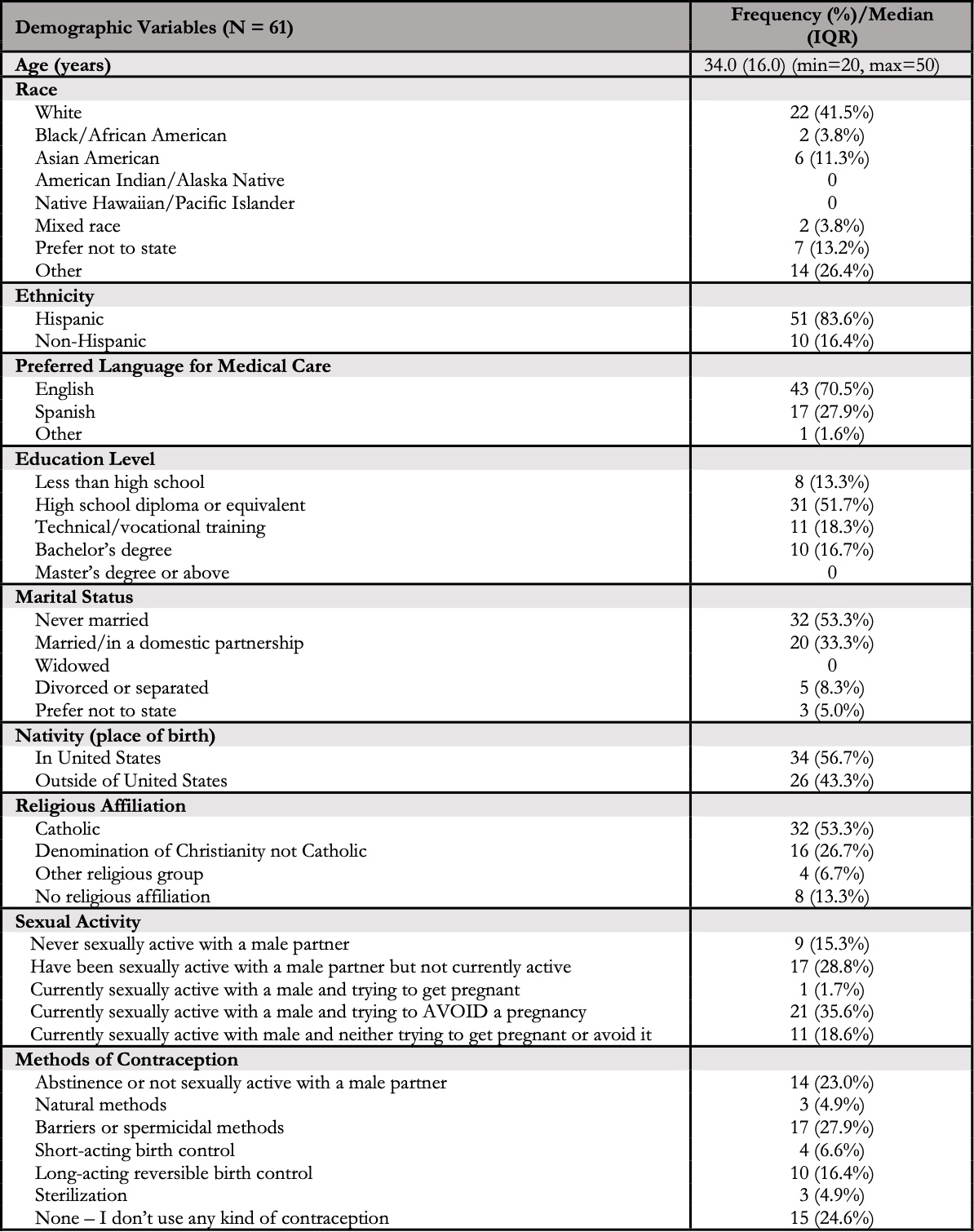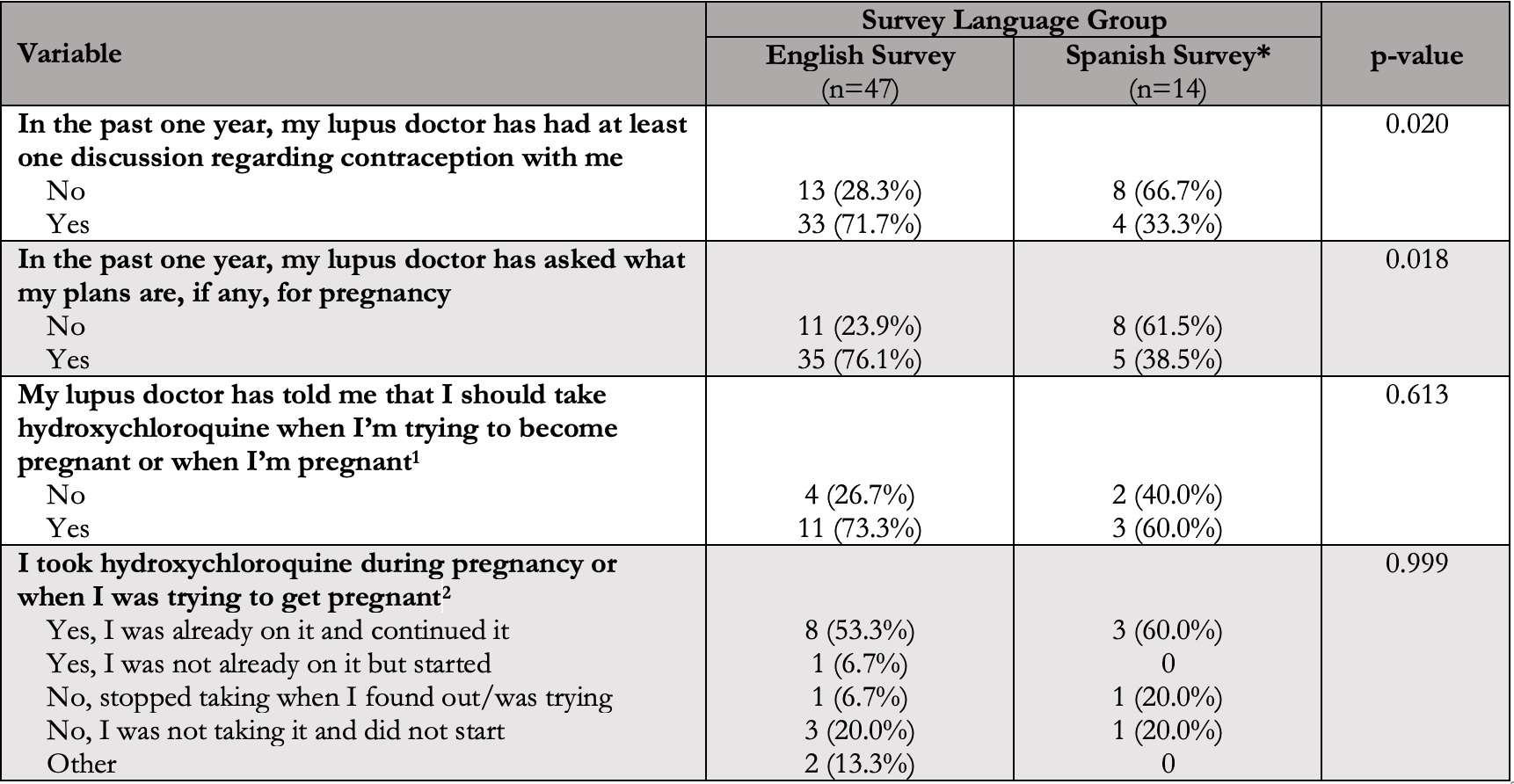Session Information
Date: Sunday, November 12, 2023
Title: (0176–0195) Healthcare Disparities in Rheumatology Poster I: Lupus
Session Type: Poster Session A
Session Time: 9:00AM-11:00AM
Background/Purpose: Systemic lupus erythematosus (SLE) primarily affects women of childbearing age, with a higher burden in non-Caucasian populations. Due to the increased risk of adverse pregnancy outcomes in SLE, especially among non-Caucasian patients, it is essential for rheumatologists to engage patients in reproductive health discussions. Our study aims to gain insight into the conversations surrounding reproductive health between rheumatology providers and a primarily Hispanic SLE population, with a focus on disparities between English-speaking and Spanish-speaking populations.
Methods: A 28-question survey based on the American College of Rheumatology 2020 Reproductive Health Guideline was developed, covering contraception, preconception counseling, and pertinent peri-partum issues. The survey was offered in either English or Spanish to female patients with SLE between the ages of 18 – 50, at a safety-net outpatient rheumatology clinic in urban Los Angeles. Data were presented using frequency (%) or median (IQR) and evaluated using Fisher’s exact or Wilcoxon rank sum test, as appropriate.
Results: From March 15 2023, to May 16 2023, 61 surveys were collected. Response rate was 92%. Participants identified as Hispanic (84%), with 71% expressing an English-language preference (Table 1). For all respondents who reported being sexually active with a male partner, 29% denied use of any kind of birth control, and only 25% noted effective contraception (long-acting reversible contraception or sterilization) (Table 1). Approximately 60% of all patients who sought pregnancy after SLE diagnosis took hydroxychloroquine (Table 2). However, while 73% of English-survey respondents noted that a rheumatologist advised them to be on hydroxychloroquine during the pre-conception/pregnancy period, only 60% of Spanish-speaking individuals were given the same counsel (Table 2). English-language respondents reported a significantly higher frequency of conversations in the past one year regarding contraception and pregnancy planning compared to Spanish-speaking respondents (72% vs. 33% and 76% vs. 39%, respectively; Table 2).
Conclusion: This study highlights the importance of thorough reproductive health discussions for patients with SLE, especially in a primarily Hispanic population. For a population known to have high rates of teratogenic medication use and/or poorly controlled disease activity, suboptimal contraception was common. Some disparities between the English and Spanish speaking population include the English-speaking population had a higher rate of conversations surrounding contraception and pregnancy in the past one year, compared to the Spanish speaking patients. This suggests potential barriers in the Spanish-speaking patient population. Hydroxychloroquine use during pregnancy or for those trying to conceive was low, although only patients who ever attempted to conceive or had a pregnancy after SLE diagnosis answered this question. Further research should explore ways of optimizing reproductive health conversations, especially regarding hydroxychloroquine and contraception use, in the management of Hispanic SLE populations.
Numbers represent frequency (column percent).
*While 17 respondents noted that they prefer receiving medical care in Spanish, only 14 of these elected to take the Spanish language survey
(1)Some respondents did not answer all questions
(2)Due to branching logic, not all participants answered each question and not all cells will add to the full study population. Individuals who did not attempt and/or experience a pregnancy after SLE diagnosis did not answer questions about hydroxychloroquine use during the pre-conception period or pregnancy.
To cite this abstract in AMA style:
Xepoleas M, Delgado M, Rodman J, Simard J, Lee S, Wise L. Reproductive Health Discussions Between Rheumatology Providers and Systemic Lupus Erythematosus Patients: A Survey of English and Spanish-Speaking Patients [abstract]. Arthritis Rheumatol. 2023; 75 (suppl 9). https://acrabstracts.org/abstract/reproductive-health-discussions-between-rheumatology-providers-and-systemic-lupus-erythematosus-patients-a-survey-of-english-and-spanish-speaking-patients/. Accessed .« Back to ACR Convergence 2023
ACR Meeting Abstracts - https://acrabstracts.org/abstract/reproductive-health-discussions-between-rheumatology-providers-and-systemic-lupus-erythematosus-patients-a-survey-of-english-and-spanish-speaking-patients/


